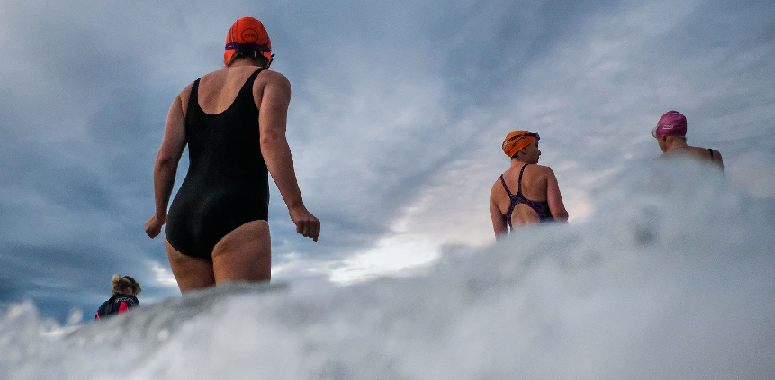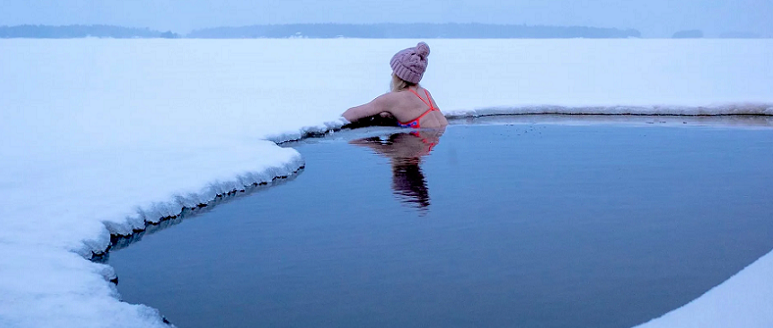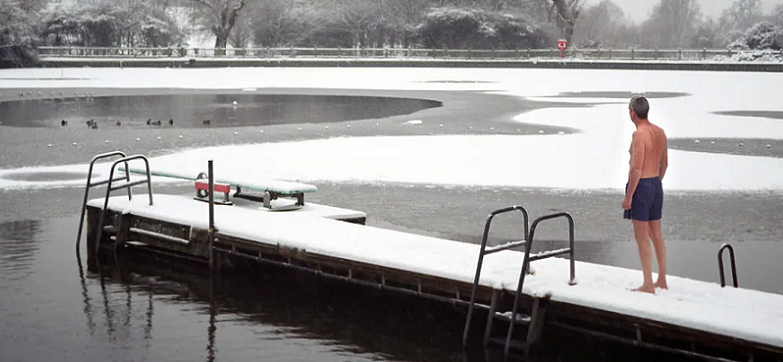
Cold water swimming, also known as winter swimming or ice swimming, involves immersing oneself in water temperatures of around 5°C or lower. While the thought of submerging into icy water may seem daunting, cold water swimming is growing in popularity due to its numerous health benefits. From boosting the immune system to reducing stress and improving mental clarity, cold water swimming has been shown to have a variety of physical and mental benefits.
What Is Cold Water Swimming?
Cold water swimming involves submerging oneself in water temperatures of around 5°C or lower. It can be done in a variety of settings, including outdoor bodies of water like lakes, rivers, or the ocean, as well as indoor pools that are specifically designed for cold water swimming.
The practice has gained popularity in recent years due to its numerous physical and mental health benefits. Despite the potential risks associated with cold water, such as hypothermia or cold shock response, many people find cold water swimming to be an invigorating and even addictive experience. With proper precautions and preparation, cold water swimming can be a safe and rewarding activity for people of all ages and fitness levels.
History of Cold Water Swimming
The practice of cold water swimming has a long and varied history that spans cultures and continents. In some cases, cold water swimming has been an integral part of cultural and spiritual traditions for centuries. For example, in Finland, the tradition of “avanto” involves cutting a hole in the ice and taking a dip in the freezing water as a form of physical and mental purification. Similarly, the Hindu festival of Makar Sankranti in India involves bathing in the Ganges River, which is considered a sacred act of cleansing and purification.
In other cases, cold water swimming has been used for practical purposes, such as in the training of Navy SEALs and other military personnel. Cold water swimming has also been used as a form of therapy, particularly for those suffering from conditions like depression, anxiety, and chronic pain.

Physical Benefits of Cold Water Swimming
Cold water swimming has been shown to provide a range of physical benefits for the body. One of the primary benefits of cold water swimming is that it can boost the immune system, as exposure to cold water can stimulate the production of white blood cells and other immune system components. Cold water swimming has been found to increase metabolism, which can lead to greater calorie burn and improved weight management. Cold water swimming may also help reduce inflammation throughout the body, which is linked to a range of chronic health conditions.
Other physical benefits of cold water swimming include improved circulation, which can help deliver oxygen and nutrients to the body’s cells more effectively, and can also help reduce the risk of heart disease and other cardiovascular conditions. Some studies have also suggested that cold water swimming may be effective for pain relief, particularly in those with chronic pain conditions like arthritis. Overall, the physical benefits of cold water swimming can be numerous and significant, making it an appealing activity for those looking to improve their health and wellbeing.

Mental Benefits of Cold Water Swimming
Cold water swimming has been found to provide a range of mental benefits that can help improve overall wellbeing. One of the primary mental benefits of cold water swimming is that it can improve mood and reduce stress. The invigorating experience of swimming in cold water can trigger the release of endorphins, which are the body’s natural mood-boosting chemicals. This can lead to an overall sense of well-being and relaxation.
In addition to improving mood, cold water swimming has been found to increase mental clarity and focus. Swimming in cold water can help activate the body’s sympathetic nervous system, which can help improve mental alertness and focus. Cold water swimming may also provide a sense of accomplishment and can help build mental resilience, as it requires a level of mental toughness and discipline to stay in the cold water for an extended period of time.
For those struggling with mental health conditions like depression and anxiety, cold water swimming may provide additional benefits. Cold water swimming has been found to increase levels of serotonin and dopamine, which are neurotransmitters that play a role in regulating mood and can be depleted in those with depression or anxiety. Cold water swimming may also provide a sense of community and social support, as many people who swim in cold water do so as part of a group or team.
The mental benefits of cold water swimming can be significant and wide-ranging. Swimming in cold water can help reduce stress, improve mood, and increase mental clarity and focus. For those struggling with mental health conditions, cold water swimming may provide additional benefits and may even be used as a form of therapy in some cases.

Safety Considerations for Cold Water Swimming
Cold water swimming can be an invigorating and rewarding experience, but it’s important to take safety precautions to avoid injury or other health risks. One of the most important safety considerations for cold water swimming is to acclimate slowly to the cold water. This means starting with short dips in cold water and gradually building up over time to longer swims. This can help the body adjust to the cold water and reduce the risk of cold shock response or other health complications.
It’s also important to dress appropriately for cold water swimming, wearing a wetsuit or other appropriate cold water gear to help keep the body warm. It’s also important to stay hydrated and to avoid swimming alone, particularly in remote or unfamiliar locations. It’s recommended to always swim with a partner or in a group, and to let someone on land know your plans and estimated return time.
Another important safety consideration is to always monitor for signs of hypothermia or other cold water injuries. Symptoms of hypothermia can include shivering, confusion, fatigue, and loss of coordination. If you or someone in your group shows signs of hypothermia, it’s important to seek medical attention immediately.
Safety considerations are critical when it comes to cold water swimming. By taking the proper precautions and building up slowly over time, you can enjoy the many physical and mental benefits of cold water swimming while minimizing the risk of injury or other health complications.
Tips for Getting Started With Cold Water Swimming
If you’re interested in trying cold water swimming, there are several tips to keep in mind to help you get started safely and effectively. One of the most important tips is to start slowly and build up gradually over time. This means starting with short dips in cold water and gradually increasing the length of your swims as your body becomes more acclimated to the cold water.
It’s also important to dress appropriately for cold water swimming, wearing a wetsuit or other appropriate cold water gear to help keep the body warm. This can help reduce the risk of hypothermia or other cold water injuries. It’s also a good idea to stay hydrated and to avoid swimming alone, particularly in remote or unfamiliar locations.
Another tip for getting started with cold water swimming is to find a safe and suitable location for your swims. This may involve researching local bodies of water or finding an indoor pool that is specifically designed for cold water swimming. It’s important to choose a location that is safe and easily accessible, and to always swim with a partner or in a group.
Staying warm in the water is also key when it comes to cold water swimming. This may involve using techniques like the “breathe and relax” method, which involves slowing your breathing and relaxing your muscles to help reduce heat loss. Other techniques for staying warm in cold water can include wearing a swim cap, earplugs, and/or neoprene gloves and socks.
Getting started with cold water swimming requires a combination of patience, preparation, and safety awareness. By taking the proper precautions and building up gradually over time, you can enjoy the many physical and mental benefits of cold water swimming while minimizing the risk of injury or other health complications.
